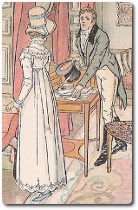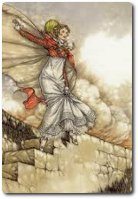Persuasion Contents
- Social / political context
- Religious / philosophical context
- Literary context
- Volume 1
- Volume 2
Captain Wentworth
An unusual Austen hero
 In many ways, Captain Wentworth is unlike any of Jane Austen's previous heroes:
In many ways, Captain Wentworth is unlike any of Jane Austen's previous heroes:
- He is not a member of the landed gentry
- He has no inherited fortune
- He has the charisma, charm and confidence that usually signal danger in Austen's male characters (as with Willoughby, for example, in Sense and Sensibility)
- His gentility comes from his honourable open character and good manners, rather than from his lineage.
The reader's perception of Wentworth
Captain Wentworth is seen largely from Anne's point of view:
- We can trust her interpretation of his interactions with others because they are based on her prior understanding of him
- In Anne's judgment, his response to her is clouded by his bitterness, so the narrator has to show us that he is open, warm and engaging with everyone else, excepting Lady Russell (and we can guess the explanation for that).
We gain additional insights into his character apart from Anne's:
- Captain Harville's account of his service to Captain Benwick in his bereavement assures us of Wentworth's charitable and compassionate heart (Ch. 12)
- Wentworth's retrospective explanation of his emotional journey in Chapter 23 / Vol. 2, Ch. 11) gives us insight into his cold treatment of Anne and assures us of his constancy.
Unlike Anne, Captain Wentworth does have to undergo some moral growth. In fact, most of the time Anne has a better understanding of the inner workings of his mind and heart than he does himself.
A suitable match?
Jane Austen's depiction of the Crofts as the ideal couple paves the way for the reader to accept and approve of Wentworth as an ideal match for Anne. Like Admiral Croft and his wife, Captain Wentworth has many things in common with Anne that provide a sure foundation for their relationship:
- Wentworth shares Anne's constancy in love, despite the way in which he handles himself with her through most of the book
- He has the 'frank, the open-hearted, the eager character' which she prizes so highly (Ch. 17 / Vol. 2, Ch. 5)
- His attentions to Dick, Anne, Louisa and Harville define him as caring and considerate
- He is at ease socially and has good manners
- He serves others on a grand scale while she serves her community
- He is hardworking and dutiful
- They are both intelligent and attractive. They are attracted to one another mentally and physically
- He shares her interest in music
- In the past, they enjoyed being together and had a great deal to say to one another.
Although for much of the book their communication falters, the final picture of them working through the misunderstandings of the past years, assures us that they are once again able to communicate with ease and depth.
Also like the Crofts, much of the suitability of the match between Wentworth and Anne relies on their complementary characteristics. We imagine they will make a good team, working side-by-side and that Wentworth's strengths will embolden Anne, and her strengths will make him more well-rounded:
- His strong-mindedness and self-assurance will help her speak up more confidently
- He is less self-reflective than she is, but by the end of the book we already see her enlightening him
- Anne will gain a good family and friends when she marries him
- His headstrong fearlessness and her prudence and restraint will temper one another towards greater balance
- His passion will encourage the latent passion we catch glimpses of in Anne
- He is full of life and we see her blooming and glowing in the warmth of his affection.
Wentworth's attitude to Anne
When Captain Wentworth first comes to Kellynch, he mistakenly believes that he no longer loves Anne and would be happy never to see her again. His bitterness, resentment and pride blind him to the truth of his feelings, and he tries to forget her (as he later admits in Ch. 23. / Vol. 2, Ch. 11). He does not realise that knowing Anne has really spoiled him from accepting any woman who does not match up to her virtues.
However, the fact that he is able to be open, agreeable, pleasant and gracious to everyone but Anne, shows his lack of indifference to her. He does not intend to hurt her with his careless assessment of her changed appearance in Chapter 7, but his general cold formality to her may be more calculated to punish than he realises.
His underlying concern is evident when he rescues Anne from little Walter Musgrove, helps her over stiles on the walk to Winthrop, and arranges for her to ride home with the Crofts because she is tired. He is also unduly interested when he hears of Charles Musgrove's proposal of marriage to Anne (Ch.10)!
Playing the field
Wentworth glibly tells his sister that he is open to marrying any young, pretty, friendly woman as long as she has a strong mind and a sweet character (an ironic choice as both qualities actually describe Anne). At first, Wentworth considers both the Musgrove girls, before deciding that Louisa Musgrove is more suitable:
- Louisa goes out of her way to demonstrate her strong-mindedness during her discussion on the walk to Winthrop (Ch.10)
- Wentworth is less impressed with Louisa's possession of a strong mind when he sees the obstinacy of her reckless jump off the Cobb, which results in serious injury
- In reality, as he admits in the final chapter, his attraction to Louisa stems from anger and pride.
Prompted by rivalry
It is jealousy of William Elliot's interest in Anne that propels Captain Wentworth to become aware of his own feelings for her:
- He notices Mr. Elliot's appreciative looks at Anne on the Cobb and allows himself to admire her too (Ch.12)
- He is curious enough to enquire after Mr. Elliot's identity
- He perceives a familiarity between Mr. Elliot and Anne at Molland's in Bath (Ch. 19 / Vol. 2, Ch. 7)
- He is so overpowered by his jealousy at the concert in Bath that he leaves before it has ended (Ch. 20 / Vol. 2, Ch. 8).
The turning point
 The turning point in Captain Wentworth's moral education occurs at Lyme in Chapter 12 when Louisa falls off the Cobb. Wentworth is finally able to discern the value of Anne's calm coolheadedness in the face of crisis, as he witnesses the disastrous effects of Louisa's wilfulness:
The turning point in Captain Wentworth's moral education occurs at Lyme in Chapter 12 when Louisa falls off the Cobb. Wentworth is finally able to discern the value of Anne's calm coolheadedness in the face of crisis, as he witnesses the disastrous effects of Louisa's wilfulness:
- He looks to Anne for instruction and direction
- He realises that she is perfectly suited to the task of caring for Louisa
- He defers to her judgment about how to break the news to Mr. and Mrs. Musgrove.
Following these realisations, Wentworth leaves Lyme and has no face-to-face interaction with Anne until she encounters him at Molland's shop in Chapter 19 / Vol. 2, Ch. 7. The change in his attitude to Anne from then on is clear:
- He is confused and embarrassed rather than coldly polite
- His conversation with her is generally more relaxed and natural on the occasions when he has reason to hope she still has feelings for him
- He refers indirectly to the constancy of his devotion to Anne through his comments on Harville's attachment to Louisa (Ch. 20 / Vol. 2, Ch. 8)
- He makes several references to their past relationship.
Reconciliation
Captain Wentworth finally confesses his own misjudgements and shortcomings to Anne in the penultimate chapter:
- He sees he has mistaken Anne's keen sense of duty for weakness of mind
- He realises that Louisa's mind cannot compare with Anne's
- He knows he was unwise in paying such attention to Louisa when he neither loved nor intended to marry her
- He sees that his pride, foolishness and rancour stood in the way of their earlier potential reconciliation.
This humbling awareness of his own errors makes him a worthy suitor for the morally clear-sighted Anne.
Recently Viewed
-
Persuasion » Captain Wentworth
now -
Jane Eyre » Timeline
just now -
Jane Eyre » Jane Eyre on film and television
just now -
Jane Eyre » How to plan an essay
just now -
Jane Eyre » Engaging with the text
just now -
Jane Eyre » Education; Class, wealth and power
just now -
Jane Eyre » The women of Thornfield
just now -
Jane Eyre » Volume 3, Chapter 9 / 35
just now -
Jane Eyre » Volume 3, Chapter 2 / 28
just now -
Jane Eyre » Volume 2, Chapter 3 / 18
just now -
Jane Eyre » Volume 1, Chapter 9
just now -
Jane Eyre » Volume 1, Chapter 8
just now -
Jane Eyre » Charlotte Bronte's education
1 minute ago -
A-Z: General definitions » Protagonist
1 minute ago -
A-Z: General definitions » Monk
1 minute ago -
The Taming of the Shrew » Textual Criticism
1 minute ago -
The Taming of the Shrew » Education
1 minute ago -
The Taming of the Shrew » The role of women
1 minute ago -
The Taming of the Shrew » Timeline of Shakespeare's works
1 minute ago -
The Taming of the Shrew » The faith setting of Shakespeare’s plays
1 minute ago -
Persuasion » Parents and children
1 minute ago -
Jane Eyre » Charlotte Brontë's early years
1 minute ago -
Jane Eyre » Charlotte Brontë - fact and fiction
1 minute ago -
Jane Eyre » Booklist
1 minute ago -
Jane Eyre » Resources and further reading
2 minutes ago
